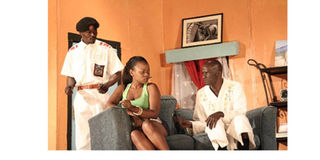Drama and poetry can help reshape society

Michael Awiti as Osiany (left), Jessica Mac'Onyango as Maid (centre) and Steve Ogana as Jatelo in the Luo play "Kanungo e teko" at the Kenya national theatre on September 30 2012. What they have probably not noticed is that educated Kenyans have a similar, if not stronger aversion to drama and plays. The two are an important genre of literature, also. PHOTO| FILE
What you need to know:
- What they have probably not noticed is that educated Kenyans have a similar, if not stronger aversion to drama and plays. The two are an important genre of literature, also.
- This is odd for two reasons. One, study of a play is a requirement for English in KCPE. Students should ideally be exposed to plays in forms one and two before embarking on intensive reading of set books.
- Plays were the earliest genre great artistes wrote. The earliest written texts of literature were in play form — written specifically to be acted. The great Greek writers — Sophocles, Aeschylus, Euripides and Aristophenes were playwrights.
I have read many complaints by newspaper readers that educated Kenyans don’t like reading poetry. They attribute this to poor orientation to poetry that most of them had in high school.
What they have probably not noticed is that educated Kenyans have a similar, if not stronger aversion to drama and plays. The two are an important genre of literature, also.
The nearest educated Kenyans have come to appreciating drama is when they are watching plays in a theatre. Beyond that, many Kenyans with secondary school and even tertiary education rarely read plays, except the one set-book they studied for the Kenya Certificate of Secondary Education (KCPE).
This is odd for two reasons. One, study of a play is a requirement for English in KCPE. Students should ideally be exposed to plays in forms one and two before embarking on intensive reading of set books.
It also odd because, plays were the earliest genre great artistes wrote. The earliest written texts of literature were in play form — written specifically to be acted. The great Greek writers — Sophocles, Aeschylus, Euripides and Aristophenes were playwrights. Ancient Rome with its great civilisation and laws, is not complete without its great playwrights, such as Plautus, Terence and Seneca.
Educated people should have a bowing acquaintance with the thinking of great playwrights. Although technological literacy is the dominant philosophy in modern educational theory, cultural literacy of the sort that literature embodies, and particularly plays, form part of the mental and intellectual furniture of educated people.
And in the great plays is to be found what Victorian lifelong educator Matthew Arnold called “the best which has been thought and said in the world.”
The mental equipment that appreciation of the great plays gives to any ambitious student complements an understanding of mathematics, engineering, medicine, information technology, law, journalism and economics, to name but a few of careers and occupations.
A reading of plays contributes to education and literacy. They teach us about human motivation and psychology. It is high time our society took keener interest in the genre.





